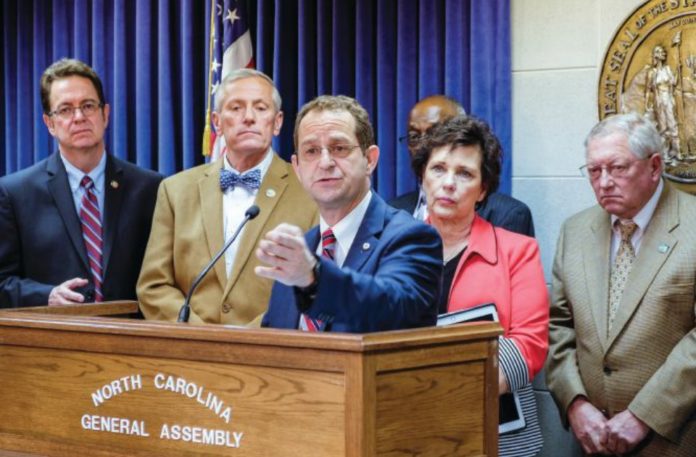Not so long ago in North Carolina, holding local elected offices — or at least being actively involved in local politics in some capacity — was seen as almost a necessity in order to seek higher offices such as state legislator. In the 1950s and 60s, the North Carolina General Assembly was heavily populated with former city council members, county commissioners, school board members and attorneys who had represented local governing boards.
More than a half century later, that has not completely changed, but the pathways to the General Assembly and other higher offices are certainly more varied.
During the 2019 legislative session, seven state senators and 18 House members had previously held office on municipal governing boards. In the Senate, two other members — Senate leader Phil Berger and Sen. Valerie Foushee — had worked extensively with municipal governments. (Berger served as town attorney for Mayodan for three decades; Foushee worked as budget administrator in the Chapel Hill Police Department.)
In the House, 18 state representatives had previous experience serving on elected municipal governing boards. Another three had some experience working in municipal government or through advisory boards.
Similar numbers have experience in county government, and a handful of North Carolina legislators served on local school boards.
Those numbers are significant, but considering there are 170 members of the General Assembly, better than half have little to no background in local government.
Four new challengers in the Senate — including NCLM immediate past president and Jacksonville Mayor Pro Tem Michael Lazzara — and seven in the House will be looking to add to those numbers in elections later this year.
In addition to Lazzara, they are: Patrick Harris, former Director Emergency Services for Smithfield in Senate District 11; Mills River Council Member Brian Caskey in Senate District 48; Asheville City Council Member Julie Virginia in Senate District 49; Havelock Commissioner Jim Kohr in House District 3; Durham City Council Member Vernetta Alston in House District 29, Hope Mills Town Council Member Frances Vinell Jackson in House District 45; Winston-Salem Council Member Dan Besse in House District 74, Salisbury Mayor Pro Tem Al Heggins in House District 76; Thomasville City Council Member Wendy Sellars in House District 80 and former Morganton Human Relations Commissioner Cecelia Surratt in House District 86.
Besides those potential newcomers to the legislature, four former legislators with municipal governing backgrounds are seeking to return to the General Assembly: former Fayetteville City Council Member Wesley Meredith, Winterville Town Council Member Tony Moore, former Cornelius Town Council Member John Bradford, and former Matthews Town Council Member Bill Brawley.
According to a couple of people who have been there and done that, those with backgrounds in local government bring an ability to build consensus to address policy problems and have typically already gained a strong understanding of many of the policy issues facing legislators, as well as understanding government budgeting and finance.
“My local government experience was very beneficial, especially in terms of the budget process and setting priorities,” said former Rockingham mayor and state Sen. Gene McLaurin. “Those with local government experience just seem to have a better perspective on decisions that are made. You can still be effective without it, but it was very helpful to me. Local decisions are usually well thought out, and there is usually a very deliberative process.”
McLaurin also noted that local government involvement in economic development, whether recruiting industry or preparing sites, is another part of the job that translates well. “Economic development is all about partnerships,” he said.
Lucy Allen, an NCLM past president and former mayor Louisburg, pointed to her involvement in both the League and National League of Cities as helping in both understanding key issue areas and understanding the perspectives of those elected officials from places very different from Louisburg.
“It is very difficult to get people to look past their own interest, whether as mayor or as a legislator. You cannot operate in a vacuum, and you have to be open to other people’s ideas,” Allen said.
Lazzara, at last year’s Town & State Dinner, noted just how connected state and local government are on so many levels, which is another reason that understanding of local government can be key to legislative effectiveness.
“Every day, state and municipal leaders are working to bring more and better jobs to their communities. They are working to preserve health care facilities. They are working to ensure that we have the necessary transportation and communication networks so that commerce can flourish and people can be connected. And, we work together to keep our communities safe and secure,” he said while speaking to several hundred legislators and municipal elected officials. That work in those same areas will not change in 2020 or the foreseeable future, making an understanding of local government as crucial as ever.














